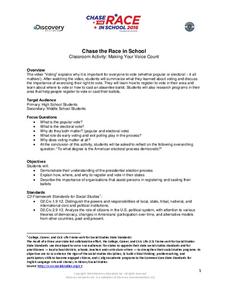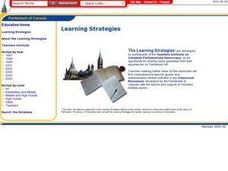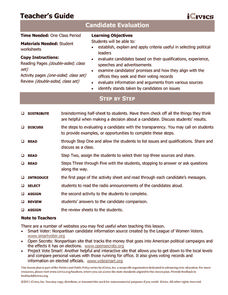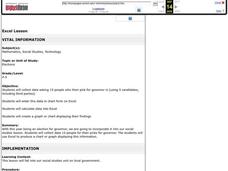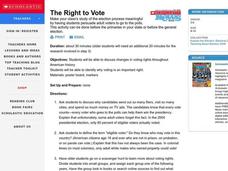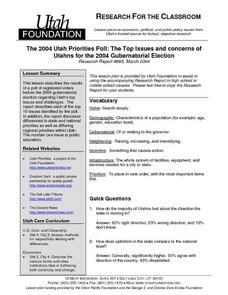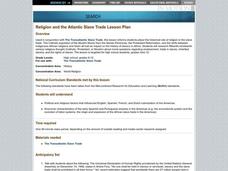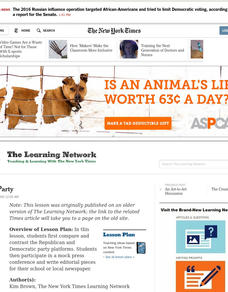Curated OER
May The Best Character Win
Students examine the financial committment to running a campaign. They discuss the difference between electroal and popular votes. They realize how involved a political campaign is!
Curated OER
Who Could Have Been Who
Can word choice affect a candidate's likeability? Use a New York Times lesson to explore how a presidential candidate's likeability factor can fluctuate in public opinion polls. Young readers choose a presidential election from their...
Teaching Tolerance
Why Local Elections Matter
Uncle Sam wants everyone to vote in local elections! Geared toward middle and high school scholars, the resource explores voter turnout and the importance of local elections. Academics participate in group discussion, complete...
Discovery Education
Making Your Voice Count
As learners watch a video on voting, they take notes on a worksheet that lists various voting topics, including electoral and popular votes, early voting, and exit polling. Then, young people research the Internet for their state's...
Curated OER
Voter Turnout
Explore politics by analyzing the voting process. Pupils discuss the purpose of casting votes in an election, then examine graphs based on the data from a previously held election's turnout. The lesson concludes as they answer study...
Curated OER
"Last Man Standing" Lesson Plan: What Do People Want from Politicians?:
Students evaluate various methods of sampling opinions, consider the role of polling in elections, and consider the role of media reporting in the outcome of elections. They gain skills they can use to analyze and evaluate media...
Curated OER
Exercising the Franchise! The Right to Vote
Pupils research Canadian election procedures, identify candidates and corresponding political platforms for current elections and hold mock elections. They develop a written report about a specific political party.
Curated OER
Exploring Historical and Current Leaders of Canada
Students research Canadian political figures and then do a presentation about them.
Curated OER
The Class Party
Students take a closer look at presidential elections. In this Electoral College lesson, students participate in a classroom simulation that requires them to form a political party that puts forth a candidate to run for election.
iCivics
Candidate Evaluation
How can we decide between candidates on election day? After contemplating various issues and qualities, your learners will go through a step-by-step process of researching and evaluating sample candidates and determining their...
Curated OER
Excel Lesson
Students explore data and Excel spreadsheets. They collect data about political candidates. Students enter the data into a chart on Excel. They create a graph using the data and Excel.
Curated OER
Election 2005: Campaign Issues
Learners take a closer look at the election of 2005. In this British politics instructional activity, students listen to a lecture about the 2005 campaign and active citizenship. Learners then create collages and news boards about the...
Curated OER
The Right to Vote
In this voting worksheet, students identify and discuss changes in voting rights throughout American history.
Then, they identify why voting is an important right for Americans. Finally, students create voting bookmarks instead of or in...
Curated OER
Reviewing the Election Process by NOW Classroom for PBS
Students take a closer look at presidential elections. In this election process lesson, students discuss the roles of the primary, caucus, polls, Electoral College, delegates, and lobbyists in the process. Students then access the listed...
Curated OER
Campaign! The Election Simulation Game
Students simulate the election process with one group acting as politicians and others acting as the constituency with concerns specific to their assigned area of the country. They give speeches, take polls, and elect a leader based on...
Curated OER
Zimbabwe
High schoolers explore the hardships being faced by the people in Zimbabwe. In this World History lesson, students research the challenges of Zimbabwe, such as hunger, poverty, low life expectancy and political controversy. Upon...
Curated OER
What Do We Owe To Thoreau?
Learners use this design as an electronic reading and writing guide to Henry David Thoreau's famous essay, "On Civil Disobedience." They use activities to familiarize students with the political issues of Thoreau's time. Comprehension...
Teaching Tolerance
The True History of Voting Rights
Explore what voting rights really are in an intriguing activity that explores the history of American voting. The resource examines the timeline of voting rights in the United States with group discussions, hands-on-activities, and...
Curated OER
The President's Day Has Arrived
Students state and defend their opinions regarding all aspects of the impeachment proceedings against President Clinton after completing a survey and researching the topic. They also consider opinion polls, media bias and global politics.
Curated OER
The 2004 Utah Priorities Poll
Students participate in a lesson that focuses on a state survey for Utah. The survey is intended to find the public opinion of how the state is doing in the public eye. They analyze the survey and create their own to research the status...
Curated OER
RELIGION AND THE ATLANTIC SLAVE TRADE
Students examine the political and religious factors that influenced English, Spanish, French, and Dutch colonization of the Americas, and the economic characteristics of the early Spanish and Portuguese empires in the Americas.
Curated OER
What Difference Does A Name Make?
Learners view the film The Persuaders that discuss the perspective and spin of language use for a variety of issues. They discuss the career of Frank Luntz, a man that runs focus groups to determine how to advantageously phrase issues in...
Curated OER
Designing Samples/Simple Random Samples
Students explore the concept of sampling techniques. In this sampling techniques lesson, students identify possible sources of bias in situations such as phone polls, supermarket surveys, and drawing names from a phone book. Students...
Curated OER
It's My Party
Students compare/contrast the Republican and Democratic platforms using Venn diagrams, then read and discuss, "The Conventions Are Over. The Party's Just Starting." students then participate in a mock press conference and write editorial...





